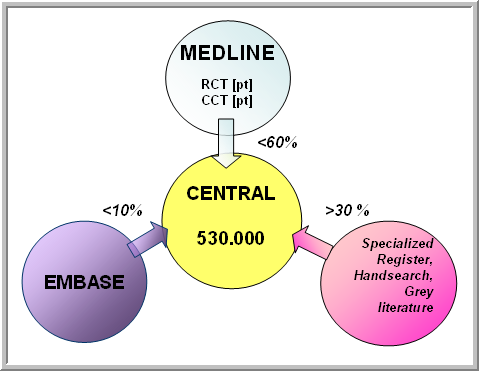 The Cochrane Handbook for Systematic Reviews of Interventions is the official document that describes in detail the process of preparing and maintaining Cochrane systematic reviews on the effects of healthcare interventions.
The Cochrane Handbook for Systematic Reviews of Interventions is the official document that describes in detail the process of preparing and maintaining Cochrane systematic reviews on the effects of healthcare interventions.
The current version of the Handbook is 5.0.1 (updated September 2008) is available either for purchase from John Wiley & Sons, Ltd or for download only to members of The Cochrane Collaboration (via the Collaboration’s information management system, Archie).
Version 5.0.0, updated February 2008, is freely available in browseable format, here. It should be noted however, that this version is not as up to date as version 5.0.1. The methodological search filters, for instance, are not completely identical.
completely identical.
As an information specialist I will concentrate on Chapter 6: Searching for studies.
This chapter consist of the following paragraphs:
- 6.1 Introduction
- 6.2 Sources to search
- 6.3 Planning the search process
- 6.4 Designing search strategies
- 6.5 Managing references
- 6.6 Documenting and reporting the search process
- 6.7 Chapter information
- 6.8 References
As the previous versions the essence of the Cochrane searches is to perform a comprehensive (sensitive) search for relevant studies (RCTs) to minimize bias. The most prominent changes are:
1. More emphasis on the central role of the Trial Search Coordinator (TSC) in the search process.
Practically each paragraph summary begins with an advice to consult the TSC, i.e. in 6.1: Cochrane review authors should seek advice from the Trials Search Co-ordinator of their Cochrane Review Group (CRG) before starting a search.
One of the main roles of TSC’s is the assisting of authors with searching, although the range of assistance may vary from advise on to how run searches to designing, running and sending the searches to authors.
I know from experience that most authors have not enough search literacy to be able to satisfactory complete the entire search on their own. Not even all librarians may be equipped to perform such exhaustive searches. That is why the handbook says: “If a CRG is currently without a Trials Search Co-ordinator authors should seek the guidance of a local healthcare librarian or information specialist, where possible one with experience of conducting searches for systematic reviews.”
Another essential core function of the TSC is the development and maintenance of the Specialized Register, containing all relevant studies in their area of interest, and submit this to CENTRAL (The Cochrane Central Register of Controlled Trials) on a quarterly basis”. CENTRAL is the most comprehensive source of reports of controlled trials (~500,000 records), available in “The Cochrane Library” (there it is called CLINICAL TRIALS). CENTRAL is available to all Cochrane Library subscribers, whereas the Specialized Register is only available via the TSC.
2. Therefore Trials registers are an increasingly important source of information. CENTRAL is considered to be the best single source of reports of trials that might be eligible for inclusion in Cochrane reviews. However, other than would be expected (at least by many authors) a search of MEDLINE (PubMed) alone is not considered adequate.
The approach now is: Specialized Registers/CENTRAL and MEDLINE should be searched as a minimum, together with EMBASE if it is available (apart from topic specific databases, snowballing). MEDLINE should be searched from 2005 onwards, since CENTRAL contains all records from MEDLINE indexed with the Publication Type term ‘Randomized Controlled Trial’ or ‘Controlled Clinical Trial’ (a substantial proportion of theses MEDLINE records have been retagged as a result of the work of The Cochrane Collaboration (Dickersin 2002)).
Personally, for non-Cochrane searches, I would rather search the other way around, MEDLINE (OVID) first, than EMBASE (OVID) and finally CENTRAL, and deduplicate the searches afterwards (in Reference Manager for instance). The (Wiley) Cochrane Library is not easy to search (for non-experienced users, i.e. you have to know the MESH beforehand, there is (yet) no mapping). If you start your search in MEDLINE (OVID) you can easily transform it in EMBASE and subsequently CENTRAL (using both MESH and EMBASE keywords as well as textwords)
3. The full search strategies for each database searched need to be included in an Appendix with the total number of hits retrieved by the electronic searches included in the Results section. Indeed the reporting has been very variable, some authors only referring to the general search strategy of the group. This made the searching part less transparent.
4. Two new Cochrane Highly Sensitive Search Strategies for identifying randomized trials in MEDLINE strategies have been developed: a sensitivity-maximizing version and a sensitivity- and precision-maximizing version. These filters (that are to be combined with the subject search) were designed for MEDLINE-indexed records. Therefore, a separate search is needed to find non-indexed records as well. An EMBASE RCT filter is still under development.
These methodological filters will be exhaustively discussed in another post.













[…] released a new Cochrane Handbook, which details some changes to their searching guidelines. Laika is going into these changes in detail and I encourage those interested in the changes to take a look […]
[…] The narrow therapy filter has found these very recent articles, because it not only searches for randomized controlled trial[Publication Type], but also for randomized AND controlled AND trial in title and abstract. The broad therapy filter (#4) searches for clinical trials in general and finds many clinical trials that are not RCT’s. The narrow (#5) and broad (#6) Cochrane RCT-filters are highly sensitive search strategies meant to identify randomized controlled filters for a Cochrane Review (see 10). […]
[…] from MEDLINE as well as from many other electronic databases and from hand-searched materials (see this post). With respect to other details:. I don’t know which NLM filter they refer to, but if they […]